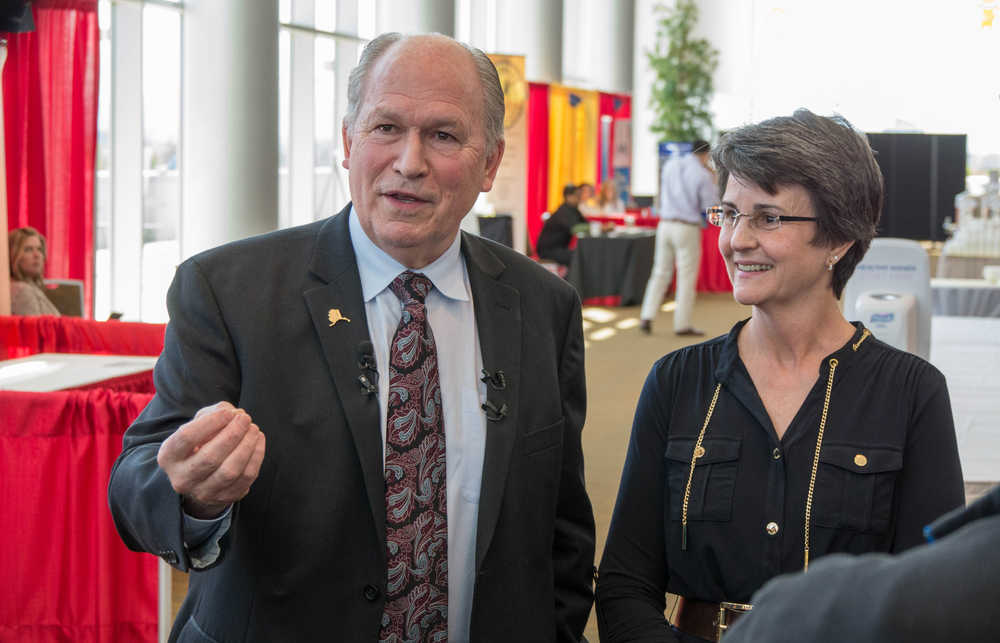Don’t tell basketball jokes to Susan Carney. She’s heard them all.
This afternoon, the former junior-varsity Harvard basketball player will become the newest member of the Alaska Supreme Court.
“The basketball thing has kind of taken on a life of its own,” she said Thursday by phone from Fairbanks, good humor in her voice.
Carney left Harvard in 1987, but in the 29 years since, she’s kept her skill on both the hardwood and in the courtroom.
“She’s … quite a baller,” Marna Sanford of the Tanana Chiefs Conference told the Fairbanks Daily News-Miner in a May interview. Sanford worked with Carney for five years in the Office of Public Advocacy and played on her women’s league basketball team.
Now, she’s joining a team of five people on the Supreme Court bench. She replaces Dana Fabe, the longtime justice who hired Carney when she first came to Alaska.
That was in 1988, when Carney was two years removed from Harvard Law School, which she attended alongside Michelle Obama (then Robinson). She left campus one year before Barack Obama arrived.
Fresh from school, she was hired as a law clerk for Alaska Supreme Court Justice Jay Rabinowitz.
“I wasn’t entirely sure what I was going to do when I graduated from law school,” she said. “I figured that well, I’ll do that and see Alaska for a year.”
Instead, after her year of clerking, she took a job with Fabe, who at the time was the head of the Alaska Public Defender Agency’s office in Anchorage. She stayed there for only a few months before transferring to the agency’s office in Fairbanks.
It was a fortunate transfer — she liked it enough that she’s lived in Fairbanks since 1988. She met her husband, Pete Graveman, there. She had a son (Sam) and daughter (Rebecca) there.
“It’s my home,” she told Mark Thiessen of the Associated Press in May.
She said by phone on Wednesday that she intends to keep living there and commute to Anchorage as necessary — even though “necessary” has come a little more often than she first thought.
Through her career, Carney has stayed a staunch defender of the accused. A Harvard Law degree can be a ticket to a high-paying corporate legal career, but Carney stayed with state service, aiding poor Alaskans who couldn’t afford to hire an attorney.
“I don’t think any public defender job is easy, but I found it fascinating,” she said.
The job required her to travel to “everything from Fairbanks north and west. That was something new and exciting to me,” she said. “I loved seeing how different communities were and how differently people lived.”
When he selected Carney for the supreme court, Gov. Bill Walker said he was impressed by Carney’s experience in rural Alaska and her willingness to stay in Alaska despite opportunities elsewhere.
Carney has participated in more than 150 trials — by her own accounting — an extraordinary figure for most attorneys.
She enjoyed seeing the happiness of a successful adoption and the sense of victory that came when someone was found not guilty.
One of her biggest triumphs came in 2006 when a jury acquitted three Fort Wainwright soldiers of murder. The jury found they acted in self-defense when confronted by a rapper nicknamed “Snoop.”
“That was a very important case,” Carney said. “These guys were supposed to deploy (to Iraq) the next day, and instead they went to jail.”
Now, Carney finds herself in a job that’s “much more academic” than her last one. Instead of working through cases, one after another, being a supreme court justice requires deep dives into each topic. “We address them in far greater depth than any public defender or public advocate can do,” she said.
When she formally is installed into office today, she said she’ll be thinking about the honor of the moment.
“It’s the supreme court of this whole state, and a few months ago, I was basically just a public defender, a public advocate. Now, I’ve moved to becoming one of just five justices overseeing the whole court, the whole court system,” she said. “At the same time I feel honored, I feel a little sort of amazed at the sort of responsibility that goes with it.”
• Contact reporter James Brooks at 523-2258 or james.k.brooks@juneauempire.com.
Read more news:
City to relocate view-blocking trees in front of Squires
Claims for expanded Medicaid group $30 million over estimates in first year
Juneau police chief talks crime rates, SB 91, body cams at Chamber lunch

